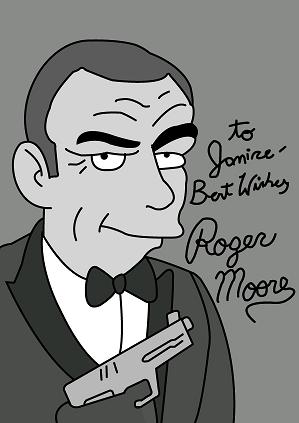Letterman's attorneys are fighting to overturn the restraining order, which forces him to stay at least three yards away from the weirdo, one Colleen Nestler, at all times. Somehow, I don't think that's going to be a problem.
Nestler's application for a restraining order was accompanied by a six-page typed letter in which she said Letterman used code words, gestures and "eye expressions" to convey his desires for her.
She wrote that she began sending Letterman "thoughts of love" after his show began in 1993, and that he responded in code words and gestures, asking her to come East.
She said he asked her to be his wife during a televised "teaser" for his show by saying, "Marry me, Oprah." Her letter said Oprah was the first of many code names for her, and that the coded vocabulary increased and changed with time.
In completely unrelated news, I've asked my attorney to look into whether or not Jessica Alba's repeated use of the word "yes" in several recent films and television appearances constitutes a legally binding agreement to my many telepathically-delivered marriage proposals, which I've typically focused on during commercials for the DVD release of The Fantastic Four.
Be sure to check back here frequently for news on where we're registered!




2 comments:
Certainly the woman is crazy, but is there any truth to her claim?
What the general public does not realize, is that all broadcast stations and many specific television shows are playing the Mooks and shearing the Sheeple.
Every broadcast network tries to collect as much information as possible from the public, about its programs. There are many ways that this is done. Numerous television shows will also separately collect, analyze and use feedback from the public. Every word of every letter or email sent to a television station or program is scrutinized. Details as to likes and dislikes are gleaned, and the information is used to provide direction, as well as develop new material. Personal anecdotes from the viewers are captured and the core messages of these mini stories are likely to be incorporated into the show.
This is referred to as reflecting. Reflecting back to the fans, that which they divulge in their communiqués. It is a strategy very similar to the ‘cold reading’ technique performed by tarot card readers. The Mark is not aware of how much they are revealing, or to what purpose their entanglement might be used.
There are practical reasons for generating and perpetuating communications with viewers. It is difficult to know public sentiment while preoccupied with a daily show. Anything the public has to say may be used in creating content. It is difficult to continually come up with new ideas and things to say without regular input from the audience, as well as other sources. It is easy to become stale in a relatively brief period of time and the ratings will immediately reflect it.
However the application of such practices can and does lead to collateral damage. The Mark or Mook is being lead-on. There are ample teasers in the form of buzzwords, gestures and visuals which are intended to excite the interested person or persons. Instigation, antagonism and other forms of provocation are often used to whip up the target. Taking their cue from ubiquitous good cop bad cop scenes, the program creators push whatever buttons they can detect.
Creating conflict between a show and individuals or certain groups or other shows is all part of hightening the drama. It contributes to creating a sense of edginess which translates into ratings and dollars. The dance they dance can be dangerous for mentally unstable individuals, from within the viewing public.
The cast members and writers of sophisticated daily television programs share ideas and information. They collaborate. Writers who work for multiple programs bring with them the knowledge and ideas generated by their other gigs. The friendships that develop among members of different shows, mostly on the same network, are used to assist each other in various ways, such as promoting each other’s projects and programs and playing the Mooks.
It is all part of creating buzz, and it is easy for the dramatis personae and crew to transgress. The heady buzz created in the pursuit of ratings and dollars makes it easy to break ethical standards. Unfortunately for an unsuspecting few, the fantasy of television can become their reality and the result is devastating. The only real question that remains is whether the network programs are culpable, or not.
1. The above commenter's question of whether there is truth to the woman's claims has an answer of no.
2. The above commenter's theory that television producers and writers expend all their creative efforts playing to isolated freaks in the crowd sounds more like an ego-building wish for the commenter than an actual idea.
3. The above commenter's claim that the only real question remaining is in regards to determining culpability is best determined by the commenter herself. Start by turning off Letterman, taking off the tinfoil hat, getting off the internet where idiocy breeds virtually unopposed, and, finally, going outside and having a breath of fresh air. While this is not guaranteed to clear your head of conspiracy theorist fervor, it might help for a moment.
(Of course, by suggesting removal of the tinfoil hat and going outside, I'm sure that I've only made it sound like I want her easier to target and manipulate by Republican brain-probing satellites. This, of course, is true. I am, in fact, operator of brain-probe Satellite NEUROS-7 in geostationary orbit at 35,897km above the surface . . . preserving national liberty since 1991!
Oh wait, I'm culpable for screwing with you, aren't I?)
Post a Comment